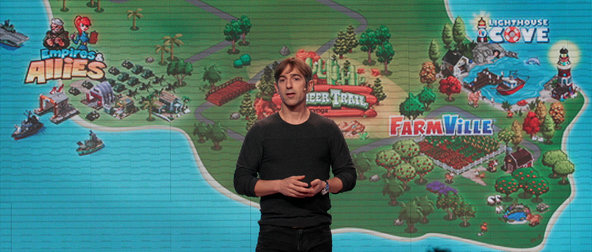 Jeff Chiu/Associated PressMark Pincus, Zynga’s chief executive. The popularity of the company’s games, like Farmville, are behind its decision to go public.
Jeff Chiu/Associated PressMark Pincus, Zynga’s chief executive. The popularity of the company’s games, like Farmville, are behind its decision to go public.
8:03 p.m. | Updated
Zynga set the price range for its initial public offering at $8.50 to $10 a share, a highly anticipated debut that could value the company at $7 billion.
At the top end of that range, the company, a four-year-old online game maker, is on track to raise $1 billion, which would make it the largest United States-based Internet offering since Google in 2004.
Its underwriters, led by Morgan Stanley and Goldman Sachs, also have the option to sell an additional 15 million shares if demand is strong, according to a regulatory filing on Friday.
Zynga’s debut reflects the tempered expectations in the I.P.O. market.
In recent weeks, investors have been shying away from newly public technology stocks, many of which are now trading below their offering prices. Groupon, the daily deals start-up that went public in early November, is off 5 percent from its debut price. Pandora, the online music service, is 33 percent below its offering.
At $7 billion, Zynga is pitching a relatively modest price to potential investors. A financing round in February valued Zynga at close to $10 billion. At one point, analysts and company insiders floated a value of $20 billion.
Zynga is planning to sell 100 million shares — or 14.3 percent of its total — a bigger stake than many Internet companies that have gone public this year. Several start-ups, like Groupon, have offered less than 10 percent of total shares in their I.P.O.’s. That strategy of constrained supply has allowed many to soar on their first day of trading, but it has also amplified volatility.
“December is historically stronger for Zynga,” said Michael Pachter, a Wedbush Securities analyst. “Most of us are scratching our heads — why go public when the market is in turmoil and you’re in the middle of a strong quarter?”
Despite the choppy nature of the I.P.O. markets, a number of companies are pushing ahead with plans to go public. Two weeks ago, Yelp, the review site, submitted its prospectus for a $100 million offering, based on a figure used to calculate the registration fee. On Friday, Michael Kors, the fashion apparel maker, announced plans to go public in an offering that could value the company at $3.63 billion.
Zynga insiders are largely holding on to their stakes. Zynga’s two largest investors — its chief executive, Mark Pincus, and a venture capital firm, Kleiner Perkins Caufield Byers — are not selling any shares in the offering, according to the filing.
Its other major venture capital investors, Institutional Venture Partners, Union Square Ventures, Foundry Venture Capital and Avalon Ventures, will each sell a little more than two million shares, but only if the underwriters exercise the overallotment option.
Zynga, unlike many of its peers, is churning out a profit, a crucial selling point as it starts its road show on Monday. It recorded earnings of $30.7 million for the first nine months of this year, on revenue of $828.9 million.
The company, which makes the bulk of its money from the sale of virtual goods, is the top game maker on Facebook, with some 227 million monthly active users. Its latest franchise, Castleville, which started about two weeks ago, has already attracted about 20 million users on Facebook, according to AppData, a site that tracks online games.
Still, there are signs that growth may be slowing. After hitting an average of 236 million monthly unique users in the first quarter, Zynga has pulled back modestly. Attracting and keeping new users is critical because only a small percentage of Zynga users actually buy virtual goods.
The company is expected to make its debut on the Nasdaq in mid-December, under the ticker ZNGA.
Article source: http://dealbook.nytimes.com/2011/12/02/zynga-aims-to-raise-up-to-1-billion/?partner=rss&emc=rss